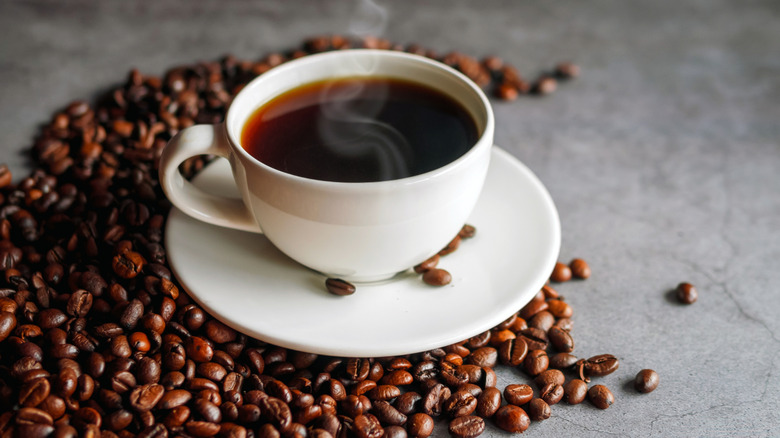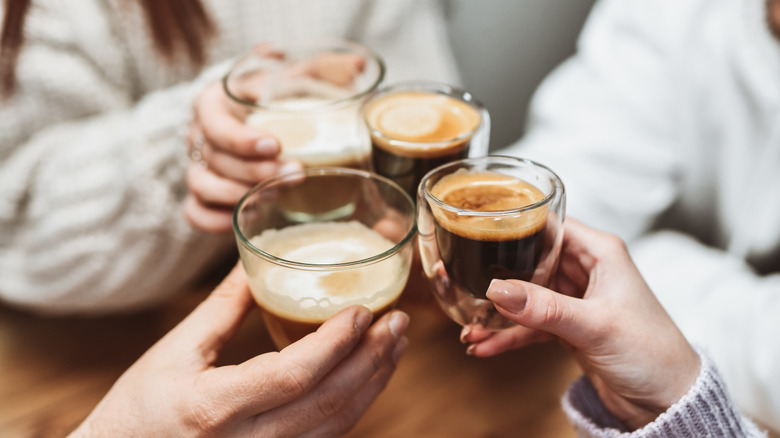Why Drinking A Cup Of Coffee At Night Isn't So Strange
Growing up in Argentina, coffee wasn't just a morning ritual; it was a life staple woven into every part of my day. As a kid, lattes made with mostly milk and just a splash of coffee marked the start of school days. These drinks slowly became more coffee-heavy as I grew older. And coffee after dinner? Not unusual at all. In fact, pairing coffee with a slice of post-dinner cake or even substituting coffee for a light evening meal was a common practice, especially on nights when I wasn't particularly hungry.
So why does this concept seem strange in the United States? While Americans are used to coffee fueling the working day, the idea of sipping it at night seems counterintuitive. But globally, drinking coffee before bed isn't all that unusual. Sure, caffeine has its effects, but it's also tied to rituals of relaxation and connection. The answer, then, is clear: Coffee at night is more about cultural habits than just a burst of energy. In many places, it's viewed as an experience, not a stimulant.
The benefits of drinking coffee at night
Drinking coffee at night has several surprising benefits which are worth considering. Beyond its energizing reputation, coffee can enhance cognitive function, improving a person's focus and mood. This makes it the perfect drink to enjoy while you reflect on your day. This might explain why some people find drinking coffee at night a calming practice, especially when enjoyed in smaller portions. Additionally, late night coffee drinking mirrors the concept of a "nightcap," providing a comforting and indulgent end to the day. This is doubly true if the coffee is made from luxurious beans like Panama geisha.
Beyond its cognitive perks, drinking coffee at night plays a significant social role in many cultures, including several European ones. In these places, coffee drinking isn't rushed; it's treated as a leisurely experience that fosters deeper conversations and creates shared moments. Whether it's catching up with loved ones or savoring a quiet moment with friends, the act of sipping coffee together strengthens bonds.
The drawbacks of drinking coffee at night
While the benefits are tempting, drinking coffee at night isn't for everyone. A scientific paper published in the Journal of Sleep Research showed that caffeine blocks adenosine, a brain chemical that helps promote sleep. As a result, even a small cup of coffee can disrupt the sleep of those sensitive to caffeine. What's more, individuals metabolize caffeine differently meaning some can enjoy a late night cup of coffee without issue while others may find themselves tossing and turning. Beyond sleep disruptions, drinking coffee late at night — or over-consuming caffeine in general — can sometimes lead to jitters or an elevated heart rate. Both of these symptoms can make it difficult for people to settle down or relax.
In the United States, norms surrounding coffee also pose challenges. Here, coffee is often super-sized. Because a large cup of drip coffee often contains more caffeine than the coffees other cultures drink late at night — for example, espresso — it can be more difficult to fall asleep after a late night coffee drinking session in the U.S. For this reason, if you're tempted to adopt the tradition, consider brewing espresso or experimenting with other lower caffeine coffees. Ultimately, deciding to embrace or avoid this nightly tradition depends on your individual relationship with caffeine, but the global appeal of drinking coffee at night is impossible to deny.


